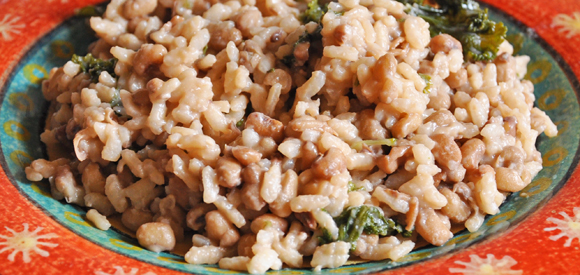May 23, 2023. Around the World in 80 Ways, eating very, very well all the Way. 80 recipes based on traditional healthy cuisines around the globe. From places and times that never heard of diabetes, overweight/obesity and cardiovascular disease epidemics. Different places, different times. Very different diets. But they all have two things in common: no highly processed foods and low daily glycemic loads. Like this classic and reputedly lucky rice & bean dish, Hoppin’ John.
With Love From the Deeply Delicious South: Hoppin’ John
Rice and black-eyed peas. Some say it’s a surefire hangover cure. Others believe it brings good luck for the New Year – the morning after a serious New Year’s Eve. And they eat cornbread with it. Because that brings prosperity.
Whatever you think about tradition and superstition – and whatever you did or didn’t drink last night – you can’t deny that rice and beans and corn make a great diet. Bean and grain dishes have sustained whole civilizations for millennia. And they’re delicious. Who knows, you might get lucky with this one.
All that non-soluble fiber in the beans really slows down the digestion of the carbohydrates and avoids sugar spikes. Add a little acidity with some chutney or a hot sauce and you’ll turn a rice dish into a low GL meal. Make it like this.
The World’s Greatest Hits
No deprivation diet here. Just a focus on better, low glycemic calories. Because all calories are not created equal. No weird food. Just the most loved meals around. The tasty, satisfying stuff. Bon voyage. Bon appétit.
The goal: a full-day Glycemic Load of less than 80.
Cost-Benefit Analysis
$4 for two huge (or four side) servings of a comforting, satisfying, delicious, high-protein, gluten-free, vegan meal. Try to find that at McDonald’s.
Let’s Do The Math
If you really eat half of this, you can walk off the 325 calories in a little over an hour. Or dance fast for 45 minutes. Or run a 5mph pace for 30 minutes.
Every Thing Is Everything
A study published in The Journal of The American Dietetic Association finds that vegetarian diets help weight management without compromising nutrition. “Studies have shown that vegetarians have lower body mass index than nonvegetarians … Mean intakes of fiber, vitamins A, C, and E, thiamin, riboflavin, folate, calcium, magnesium, and iron were higher for all vegetarians than for all nonvegetarians.“


